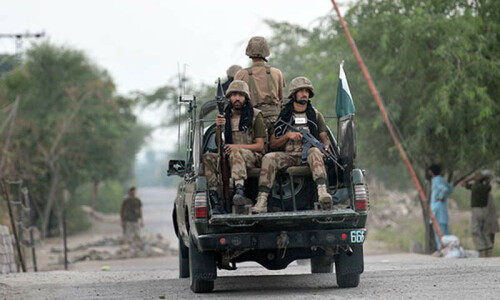THE 50th anniversary of Bangladesh declaring independence has passed quietly in Pakistan. Our prime minister wrote a congratulatory letter to Prime Minister Hasina Wajed, commenting on the nations’ intertwined destinies, but academic attempts to debate the events of 1971 were stifled. Nations that cannot confront their past, struggle to chart a better future.
Analyses of the events leading up to 1971 typically focus on implications for Pakistani federalism or the current political economy. But the creation of Bangladesh also sheds light on the political impact of climate change, a subject of critical importance today.
On Nov 12, 1970, around three weeks before Pakistan’s first democratic elections were scheduled, the Bay of Bengal was devastated by the Bhola Cyclone. More than 300,000 people were killed, and the terrain, livestock, and livelihoods of numerous districts destroyed. The cyclone highlighted governance failings and poor infrastructure development in what was then East Pakistan, and the military government’s sluggish response was widely criticised. Several academic studies conclude that its aftermath likely swelled the Awami League’s poll results.
There is growing recognition that climate change fuels political instability, but the discourse is securitised. A Stanford-led study in 2019 estimated that climate has influenced between three and 20 per cent of armed conflict risk over the past century, a trend that is expected to dramatically accelerate.
Climate events shine a spotlight on governance.
It is by now well-known that a severe drought in Syria — the worst in modern times — and the resulting rural-urban migration fuelled that country’s civil war. A UN report in 2018 pointed to the link between climate change and conflict in the Horn of Africa and called for urgent state-level climate risk management. In the Pakistani context, there is growing acknowledgement that climate change — particularly as it manifests as water scarcity — could be a key trigger for conflict with India, and climate security policies are evolving accordingly.
Research into the climate-conflict nexus has started to identify clear trends. Climate change is more likely to lead to armed conflict in areas where some form of conflict is already underway, institutions are weak, and essential services inaccessible. Conflict is more likely to erupt in autocratic contexts following climate-related economic shocks.
What is less well-researched is how climate events can influence political developments, ranging from electoral trends to sudden political upheavals. Recent studies in US states draw unsurprising conclusions: voters tend to punish incumbent politicians for natural disasters or climate events such as hurricanes, unless incumbents are perceived to have responded proactively, in which case they enjoy slight electoral gains. Understanding how climate change will drive political developments should be a key priority for our political parties and establishment.
Climate events have political implications because they shine a spotlight on states’ governance, efficiency of service delivery, and approach to infrastructure development. Long-term neglect, such as the failure to develop disaster management plans or invest in climate mitigation strategies, suddenly comes to the fore after a climate event.
Additionally, climate events serve as powerful tests of state transparency and accountability. Governments’ approaches to sharing accurate, timely information about the climate event, and acknowledging whether the event could have been mitigated or avoided if the state had acted differently, are key to either strengthening or fraying the contract between state and citizen.
Significant climate events are ruptures that provide states with new opportunities to build public trust. If mishandled, however, they may result in a political vacuum in which new actors can emerge and establish new narratives, often by fanning emotions and channelling post-disaster grief into a new politics.
Most analysis of the political impact of climate change assumes a major, one-off event like the Bhola Cyclone. But as climate events become more routine (multi-year droughts, failed crop harvests, locust plagues, flash floods), we need to better understand which might serve as political tipping points in the same way as a natural disaster. Further study into the issues climate change catalyses — such as higher food prices, fewer job opportunities, and accelerated internal migration — and the resulting political fallout is also urgently needed.
We already know that Pakistan is among the most climate-insecure nations on earth. The future holds cycles of flooding, drought and intense heat waves. For our political parties and establishment not to have meaningful environmental agendas is another sign of their short-sightedness. Perhaps looking back to Bhola will inspire them to be better prepared.
The writer is a political and integrity risk analyst.
Twitter: @humayusuf
Published in Dawn, April 5th, 2021













































